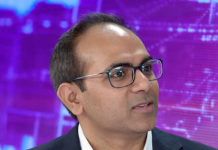Too many people still do not have a financial plan in place and are unaware of how vital it is for themselves and their families, according to Angela Pecoraro, CEO of financial software developer Advicent.
A lack of financial awareness can leave people in tough positions with their future. Whether that is not being able to afford certain necessities, being unable to put down a deposit for a house or having enough money for retirement, people can struggle if they do not prepare. A study from Israel-based Bank Leumi stated that 90% of UK consumers felt they were uneducated on personal finance and 47% were looking towards financial institutions to teach them.
People are in need of help with their financial planning. Pecoraro stated that a lot of people do not understand why it is important for good financial planning to reach goals and are less willing to engage with apps offering these services. “In fact, they don’t even know what to ask advisors about financial planning—advisors have to start those conversations in most cases,” she said.
Companies like Advicent are helping to change this issue. The company develops SaaS technology solutions for the financial services space. Its flagship product is the NaviPlan, which offers a financial planning platform to help advisors give their clients sophisticated and precise plans to meet their financial goals. The platform leverages its technology to optimise financial planning software user experience for consumers as well as enable advisors to efficiently meet regulatory changes.
“Our mission at Advicent is to enable everyone to understand and impact their financial future,” Pecoraro said. “NaviPlan is innovating the retirement planning process by creating self-direct planning experiences that financial institutions can implement to provide retirement planning experiences for all consumers, even those that don’t traditionally have access to their own advisor.” To further this goal, the company recently released its Guided Retirement tool, enabling clients to see how much money they need to meet their retirement goal and begin discussions on how to achieve this.
It’s not just the UK where consumers are in need of support with their financial future. A report from the US retail bank KeyBank found that 75% of consumers in the US believed they were financially savvy, with even 41% claiming to be better than most others. However, the study found 54% of consumers made mistakes with their personal finance by going on spending spurts and buying things they did not need. Poor budgeting was the most common faux pas given by respondents, with 47% admitting to failing foul of it.
NaviPlan has designed a number of application programming interfaces (APIs) to improve self-directed planning. Institutions can incorporate a selection of the APIs to build a personal finance solution that boasts automated goals-based investing, account aggregation and management tools. By incorporating this, they can encourage their clients to be more financially savvy and avoid making lapses with their savings.
For example, an investor can be guided through digital planning experiences which will help them reach their goals, or they can see retirement illustrations to better visualise how retirement would look based on their current financial plan. The technology also enables the self-directed risk profile which lets the user adapt their risk tolerance to see how their projected returns change.
Without engaging with these types of tools, things could get even worse for those with poor financial planning. People are staying healthier and as a result living longer. While this is great, it does mean their finances need to last more years in retirement. It’s not just things like food and utility bills they will need to spend more money on, but also healthcare.
“As people continue to live longer, they will understandably need more money to help them pay for related health expenses, so we think there is going to be an ever-increasing need to incorporate potential healthcare costs into financial planning,” Pecoraro said. Advcent is already looking towards this future, having recently established a partnership with healthcare analytics company Aivante. The deal lets advisors forecast how much a client would realistically need to cover their healthcare expenses in retirement, as well as their other living and leisure spending.
Another prospect for the future is that fee compression will have big impacts on advisors and their clients, she stated. Advisors will need to explore alternative methods of monetising their services as more robo-advisors enter the market, lowering advisory fees. Further to this, institutions will offer more no-commission trade platform consumers, putting more revenue strains on wealth managers. “Financial planning is an obvious service with enormous value for clients that is still under monetized,” Pecoraro said. “I’d expect to see more advisors charging for their planning services in the years ahead while enterprise institutions race to implement self-directed planning experiences to attract younger clients that will eventually be advisory clients in the future.”
As the world becomes more digital, consumers’ perception of how businesses should work are changing. With smartphones taking up a lot of people’s attention throughout the day, whether that be to message friends, search something up online or just fill the time on an awkward train journey, a lot of time is spent on phones. Pecoraro believes this is also changing the level of interactions people want to have with their financial plans, rather than letting it tick away in the background, they want to check how things are doing or see what else they can do to improve it.
She said, “Nearly everyone views a screen at some point during their day, most with smartphones in their pockets they are checking constantly. The need for customer interactions to be visually engaging has increased as a result of those evolving expectations. In addition, many of today’s investors want some level of active involvement with their financial plans, so by presenting complex information in an easy-to-understand fashion, advisors are able to meet those engagement needs.”
Is change coming?
Financial institutions have been notoriously reliant on their legacy systems. These stale technology stacks make it hard to embrace the changing nature of financial planning and meeting customer expectations. Many of these organisations are reluctant to do away with the technology in favour of more integrated systems because “they fear the process will be too costly and time-consuming,” she stated.
However, the coronavirus pandemic is playing havoc around the world. Governments have implemented lockdowns, forcing people to stay indoors and only allowed outside for necessities. This situation has highlighted the need of digital and mobile solutions, particularly in the wealth management sector, she said. People can no longer have face-to-face meetings with their advisors, meaning a video call or digital tools are the only way a client can engage with their financial plans. By having digital services available, people can engage with their advisors and put their minds at ease of challenges in the market impacting their future.
There are a number of businesses out their offering their hand out to others in these tough times, including restaurants offering discounted food to healthcare workers. NaviPlan is one of the companies helping. The company has made its client portal available to financial advisors at no extra cost until December 2021. It is also supplying free and unlimited access to advisor marketing materials, to ensure they can keep running during the market uncertainty.
“As CEO of a FinTech company, developing solutions to move the financial planning industry forward has been an amazing and fulfilling opportunity,” she said. “Not only are we helping advisors run their practices smarter and more efficiently, we’re ultimately helping their clients achieve their financial goals and dreams. We believe everyone deserves a customized plan that address their specific needs and seek to provide tools for advisors to meet those expectations.”
Advicent was recently named in the WealthTech100 2020 list, to check out the full WealthTech100 click here: WealthTech100
Copyright © 2020 FinTech Global












